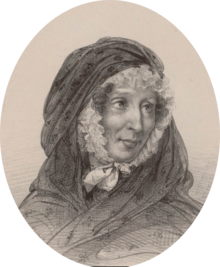Victoire Babois
Victoire Babois | |
|---|---|
 | |
| Born | 6 October 1760 Versailles, France |
| Died | 18 March 1839 (aged 78) Paris, France |
| Language | French |
| Genre | Elegy |
| Relatives | Jean-François Ducis (uncle) |
Victoire Babois, also known as Victoire-Magueritte Babois (6 October 1760 – 18 March 1839), was a French poet and writer of elegies. Married in 1780, she suffered tragedy when her five-year-old daughter Blanche died in 1792. This experience led her to write an elegy to her daughter, which, encouraged by her uncle Jean-François Ducis, she published in 1804. The collection of poems was reprinted six times in the following six years, and influenced other French poets, including Marceline Desbordes-Valmore and Alphonse de Lamartine. She published other collections of elegies, including political works that commented on contemporary events like the Napoleonic Wars. She died on 8 March 1839 and is buried in Paris.
Biography
[edit]Babois was born in Versailles on 6 October 1760, the only daughter of Jean-Baptiste and Magueritte, née Lapoulide. She was known by the forename Victoire-Magueritte and Victoire. She received very little education, although she later recalled enjoying reading Jean Racine.[1] She married Jacques-Nicolas Gosset in 1780. However, her only child, a girl named Blanche, died in 1792 at the tender age of five. After this, her marriage did not last and she separated from her husband and divorced in 1793.[2]
This experience of tragedy inspired her to write poetry.[3] Her uncle, Jean-François Ducis, encouraged her to publish and her first anthology of elegies was published in 1804.[4] The poems, a response to the death of her daughter, proved very popular and were reprinted six times before 1810. Meanwhile, she had met the poet Jean-Jacques Karpff in 1806, who subsequently lodged with her until his death in 1829.[5]
She became increasingly well known in literate circles for her elegies and, in 1815, published an elegy on the death of Ducis. He wrote of her, "Née pour être amante, épouse, mère et patriote passionnée, pour être excellente fille, fidèle et généreuse amie, vous avez dû souffrir beaucoup. Telle a été votre destinée. Mais, votre douleur maternelle, confiée à vos éloquentes élégies, vivra longtemps dans vos vers." ("Born to be a lover, wife, mother and passionate patriot, to be an excellent daughter, a faithful and generous friend, you must have suffered a lot. Such has been your destiny. But, your maternal grief, enshrined in your eloquent elegies, will live forever in your verse.")[1]
Babois was also known for other publications. Her letters to her brother as a child has proved a useful source of contemporary information on female education at the time.[6] She also wrote political elegies, which were collated towards the end of her life. These included comments on her negative experiences of meeting English soldiers during the Napoleonic Wars.[7] She influenced other French poets, including Marceline Desbordes-Valmore and Alphonse de Lamartine.[8] She died in Paris on 8 March 1839 and is buried beside Karpff in Père Lachaise Cemetery in Paris.[1][9][10]
Writing
[edit]Babois wrote elegies, which were published in collections during her lifetime.[11]
- Élégies sur la mort de sa fille âgée de cinq ans (Elegies on the death of a five-year-old daughter), 1804
- Élégies maternelles (Maternal Elegies), 1810
- Élégies et poésies diverses (Various poems and elegies), 1810
- Élégie sur la mort de Ducis, membre de l'Institut royal de France (Elegy on the death of Ducis, member of the Royal Institute of France), 1816.
- Épître aux romantiques (Letter to the Romantics), 1830
- Élégies nationales (National elegies), 1836
References
[edit]Citations
[edit]- ^ a b c Séché 1908, p. 168.
- ^ Krueger & Shapiro 2008, p. 539.
- ^ Finch 2006, p. 270.
- ^ Babois 1828, p. 201.
- ^ Lebert 1856, p. 303.
- ^ Finch 2006, p. 29.
- ^ Finch 2006, p. 239.
- ^ Boutin 2000, p. 168.
- ^ Sabatier 1988, p. 16.
- ^ Domenico 2002, p. 334.
- ^ Babois 1828, p. 200.
Bibliography
[edit]- Babois, Victoire (1828). Élégies et Poésies diverses, Tome 2, Troisième édition, Lettres de Monsieur Ducis à Mme Babois, Dixième Lettre. Paris: Nepveu.
- Boutin, Aimee (2000). "Marceline Desbordes-Valmore and the Sororoty of Poets". Women in French Studies. 9: 165–180. doi:10.1353/wfs.2001.0014. S2CID 192599777.
- Domenico, Gabrielli (2002). Dictionnaire historique du cimetière du Père-Lachaise XVIIIe et XIXe siècles (in French). Paris: Les Éditions de l'Amateur. ISBN 978-2-85917-346-3.
- Finch, Alison (2006). Women's writing in Nineteenth-Century France. Cambridge: Cambridge University Press. ISBN 978-0-52102-454-9.
- Krueger, Roberta; Shapiro, Norman R. (2008). French Women Poets of Nine Centuries: The Distaff & the Pen. Baltimore: Johns Hopkins University Press. ISBN 978-0-80188-804-5.
- Lebert, H. (1856). "Jean-Jacques Karpff, dit Casimir". Revue d'Alsace: 199–304.
- Sabatier, Robert (1988). Femmes poètes du XIXe siècle. Paris: Allen Michel. ISBN 978-2-22601-395-8.
- Séché, Alphonse (1908). Les Muses Francais:: Anthologie des Femmes-Poètes (1200 à 1891) (in French). Paris: Louis Michaud.
![]() Media related to Victoire Babois at Wikimedia Commons
Media related to Victoire Babois at Wikimedia Commons
